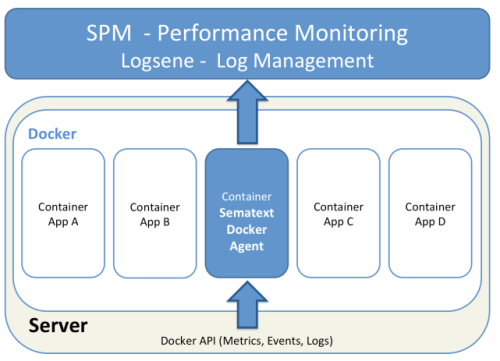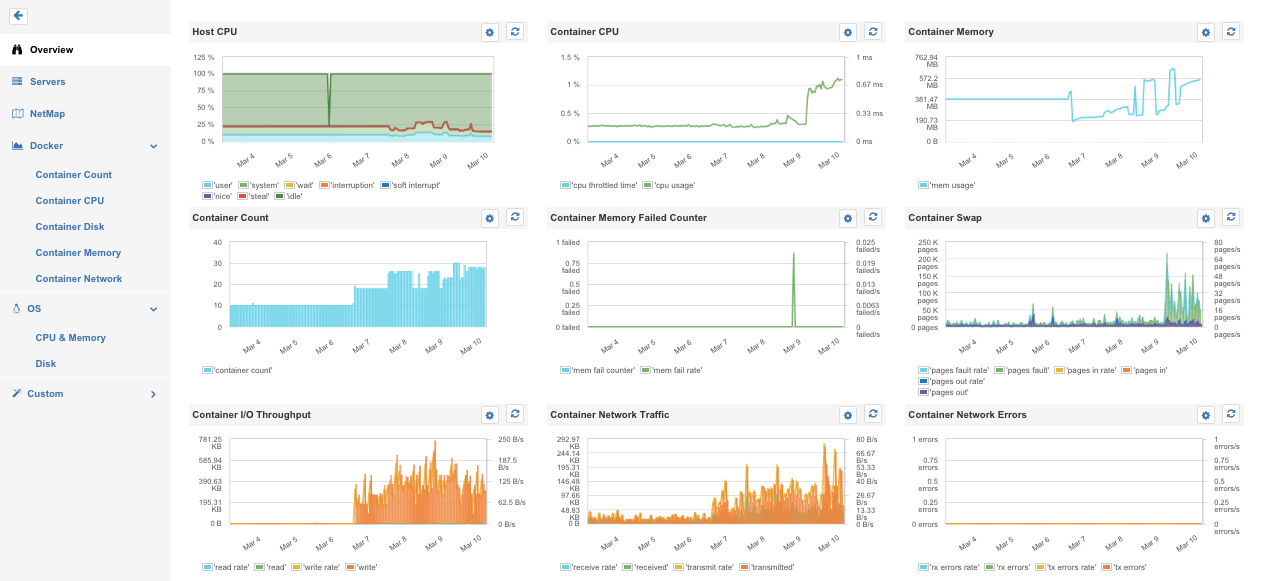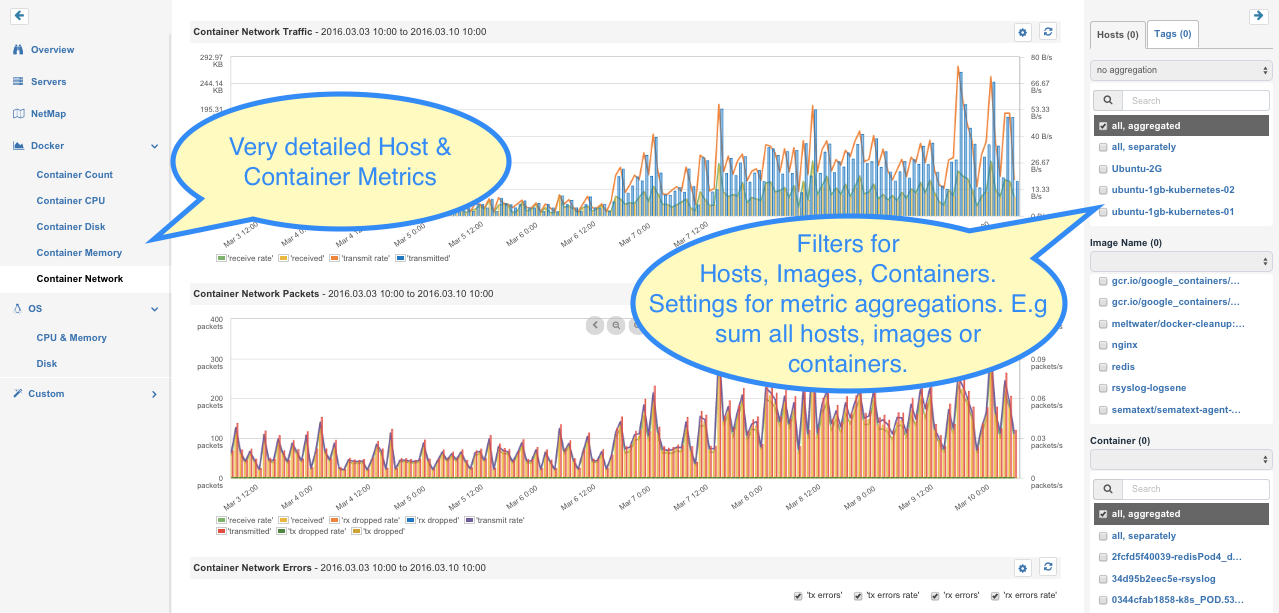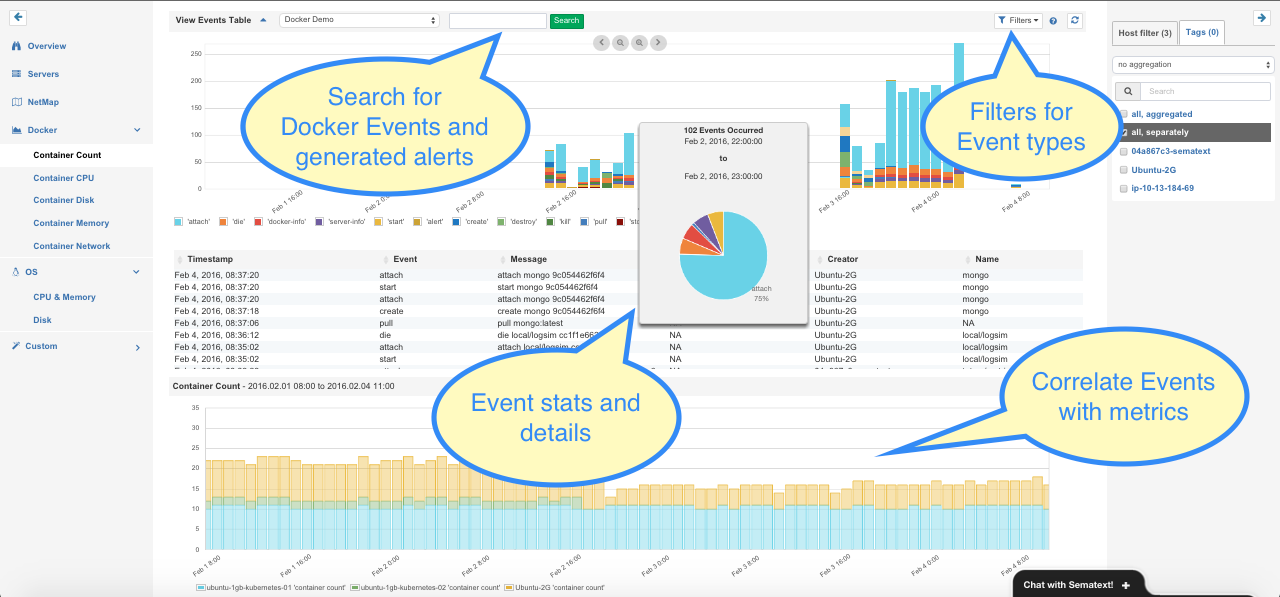- latest - the latest release (stable)
- X.Y.Z - release version (stable)
- X.Y.Z-rc1-N - release canditates (unstable)
- dev - build from github master branch (unstable)
- swarm3k - custom build for SwarmZilla, used only for the swarm3k test.
 |
 |
Sematext Agent for Docker collects Metrics, Events and Logs from the Docker API for SPM Docker Monitoring & Logsene / Hosted ELK Log Management. Works with CoreOS, RancherOS, Docker Swarm, Kubernetes, Apache Mesos, Hashicorp Nomad, Amzon ECS, ... see installation.
How it works
Video: Log Management for Docker
Gathered information:
| Type | Description |
|---|---|
| Operating System Metrics | Host machine metrics CPU / Mem / Swap / IO |
| Docker Container Metrics/Stats | CPU Usage, Memory Usage, Network Stats, Disk I/O Stats |
| Events | |
| Agent Startup Event | server-info – created by spm-agent framework with node.js and OS version info on startup |
| docker-info – Docker Version, API Version, Kernel Version on startup | |
| Docker Events | |
| Container Lifecycle Events | create, exec_create, destroy, export, ... |
| Container Runtime Events | die, exec_start, kill, pause, restart, start, stop, unpause, ... |
| Docker Logs | |
| default fields | host / IP address, docker_host, container id, container name, image name, message |
| Log format detection and log parsers | NGINX, Apache httpd, Kafka, Solr, HBase, Zookeeper, Cassandra, MySQL, MongoDB, Redis, Elasticsearch, Nsq.io |
| JSON, Plain Text |
-
Get a free account at sematext.com/spm
-
Create an SPM App of type "Docker" and copy the SPM Application Token
- For logs (optional) create a Logsene App to obtain an App Token for Logsene
-
Run the image
docker run -d --name sematext-agent-docker -e SPM_TOKEN=YOUR_SPM_TOKEN -e LOGSENE_TOKEN=YOUR_LOGSENE_TOKEN -e HOSTNAME -v /var/run/docker.sock:/var/run/docker.sock sematext/sematext-agent-docker```
You’ll see your Docker metrics in SPM after about a minute.
- Watch metrics, use anomaly detection for alerts, create e-mail reports and much more ...
| Parameter / Environment variable | Description |
|---|---|
| Required Parameters | |
| SPM_TOKEN | SPM Application Token, enables metric and event collection |
| LOGSENE_TOKEN | Logsene Application Token enables logging to Logsene, see logging specifc parameters for filter options and Log Routing section to route logs from different containers to separate Logsene applications |
-v /var/run/docker.sock |
Path to the docker socket (optional, if dockerd provides TCP on 2375, see also DOCKER_PORT and DOCKER_HOST parameter) |
| TCP and TLS connection | If the unix socket is not available Sematext Agent assumes the Container Gateway Address (autodetect) and port 2375 as default (no TLS) - this needs no configuration. In case the Docker Daemon TCP settings are different, you have to configure the TCP settings. The TCP settings can be modified with the following parameters |
| DOCKER_HOST | e.g. tcp://ip-reachable-from-container:2375/ - default value 'unix:///var/run/docker.sock'. When the unix socket is not available the agent tries to connect to tcp://gateway:2375. In case a TCP socket is used there is no need to mount the Docker unix socket as volume |
| DOCKER_PORT | Sematext Agent will use its gateway address (autodetect) with the given DOCKER_PORT |
| DOCKER_TLS_VERIFY | 0 or 1 |
| DOCKER_CERT_PATH | Path to your certificate files, mount the path to the container with "-v $DOCKER_CERT_PATH:$DOCKER_CERT_PATH" |
| Optional Parameters: | |
| --privileged | The parameter might be helpful when Sematext Agent could not start because of limited permission to connect and write to the Docker socket /var/run/docker.sock. The privileged mode is a potential security risk, we recommend to enable the appropriate security. Please read about Docker security: https://docs.docker.com/engine/security/security/ |
| HOSTNAME_LOOKUP_URL | On Amazon ECS, a metadata query must be used to get the instance hostname (e.g. "169.254.169.254/latest/meta-data/local-hostname") |
| HTTPS_PROXY | URL for a proxy server (behind firewalls) |
| LOGSENE_RECEIVER_URL | URL for bulk inserts into Logsene. Required for Logsene On-Premises only. |
| SPM_RECEIVER_URL | URL for bulk inserts into SPM. Required for SPM On-Premises only. |
| EVENTS_RECEIVER_URL | URL for SPM events receiver. Required for SPM On-Premises only. |
| Docker Logs Parameters | |
| Whitelist containers for logging | |
| MATCH_BY_NAME | Regular expression to white list container names |
| MATCH_BY_IMAGE | Regular expression to white list image names |
| Blacklist containers | |
| SKIP_BY_NAME | Regular expression to black list container names |
| SKIP_BY_IMAGE | Regular expression to black list image names for logging |
| PATTERNS_URL | Load pattern.yml via HTTP e.g. -e PATTERNS_URL=https://raw.githubusercontent.com/sematext/logagent-js/master/patterns.yml |
| LOGAGENT_PATTERNS | Pass patterns.yml via env. variable e.g. -e LOGAGENT_PATTERNS="$(cat ./patters.yml)" |
| PATTERN_MATCHING_ENABLED | Activate logagent-js parser, default value is true. To disable the log parser set the value to false. This could increase the throughput of log processing for nodes with a very high log volume. |
| -v /yourpatterns/patterns.yml:/etc/logagent/patterns.yml | to provide custom patterns for log parsing, see logagent-js |
| -v /tmp:/logsene-log-buffer | Directory to store logs, in case of a network or service outage. Docker Agent deletes this files after successful transmission. |
| KUBERNETES | 1 enables parsing of container names into the fields kubernetes.pod_name, kubernetes.namespace and kubernetes.container_name |
| GEOIP_ENABLED | trueenables GeoIP lookups in the log parser, default value: false |
| MAXMIND_DB_DIR | Directory for the Geo-IP lite database, must end with /. Storing the DB in a volume could save downloads for updates after restarts. Using /tmp/ (ramdisk) could speed up Geo-IP lookups (consumes add. ~30 MB main memory). |
| ENABLE_LOGSENE_STATS | Enables logging of tranmission stats to Logsene. Default value 'false'. Provides number of logs received, number of logs shipped, number of failed/successful http tranmissions (bulk requests to Logsene) and re-transmissions of failed requests. |
Routing logs from different containers to separate Logsene Apps can be configured via docker labels (or environment variables e.g. on Kubernetes). Simply tag a container with the label (or environment variable) LOGSENE_TOKEN=YOUR_LOGSENE_TOKEN.
Sematext Agent inspects the containers for this Label and ships the logs to the defined Logsene App.
To disable logging to Logsene/Elasticsearch label the application container with LOGSENE_ENABLED=false. LOGSENE_ENABLED=true enables logging for the container again.
Example: The following command will start nginx webserver and logs for this container will be shipped to the related Logsene App.
docker run --label LOGSENE_TOKEN=REPLACE_WITH_YOUR_LOGSENE_TOKEN -p 80:80 nginx
# or use environment variable on Kubernetes (no support for Docker labels)
# docker run -e LOGSENE_TOKEN=REPLACE_WITH_YOUR_LOGSENE_TOKEN -p 80:80 nginx
All other container logs will be shipped to the Logsene App specified in the docker run command for sematext/sematext-agent-docker with the environment variable LOGSENE_TOKEN.
SPM for Docker recognizes log formats - so your logs arrive in a structured format in Logsene! The format recognition, data extractions, date parsing etc. is provided by logagent-js and covers:
- Format detection e.g. for
- Mongo DB
- Nginx
- Apache httpd, Kafka, Cassandra, HBase, Solr, Zookeeper
- MySQL
- Redis
- Mongo DB
- plain text log messages
- line delimited JSON logs
- GeoIP enrichment for webserver logs, or any other field defined in the pattern definitions
To use a custom pattern definition simply mount a volume to '/etc/logagent/patterns.yml':
-v /mydir/patterns.yml:/etc/logagent/patterns.yml
Feel free to contribute to logagent-js to enrich the default pattern set.
Sematext Agent for Docker can monitor CoreOS clusters including metrics and logs from Docker and journald.
See: Setup Sematext Agent on CoreOS
Run Sematext Agent as Kubernetes DaemonSet.
- Get a free account at sematext.com/spm
- Create an SPM App of type "Docker" and copy the SPM Application Token
- For logs (optional) create a Logsene App to obtain an App Token for Logsene
- Create sematext-agent.yml - and set your SPM and Logsene App Token in the section spec.env.
- Run the DaemonSet
kubectl create -f sematext-agent.yml
For Swarm on Docker engine > v1.12 use a global service to deploy the agent to all cluster nodes:
docker service create --mode global --reserve-memory 128mb --restart-condition any \
--name sematext-agent-docker \
--mount type=bind,src=/var/run/docker.sock,dst=/var/run/docker.sock \
-e SPM_TOKEN=YOUR_SPM_TOKEN \
-e LOGSENE_TOKEN=YOUR_LOGSENE_TOKEN \
sematext/sematext-agent-docker
Adjust the reserved memory to your needs (>70 MB).
Please read Docker Swarm: Collecting Metrics, Events & Logs for previous Swarm versions.
Please read RancherOS Monitoring and Logging Support there are various deployment options for Rancher, Swarm, Kubernetes or Mesos.
In addition we recommend to read Rancher Labs blog post about the RancherOS Catalog Entry.
See and example of the job description for Nomad by Hashicorp
Please note that you have to specify the number of Mesos nodes (instances), SPM App Token and Logsene App Token. Example call to the Marathon API:
curl -XPOST -H "Content-type: application/json" http://your_marathon_server:8080/v2/apps -d '
{
"container": {
"type": "DOCKER",
"docker": {
"image": "sematext/sematext-agent-docker"
},
"volumes": [
{
"containerPath": "/var/run/docker.sock",
"hostPath": "/var/run/docker.sock",
"mode": "RW"
}
],
"network": "BRIDGE"
},
"env": {
"LOGSENE_TOKEN": "YOUR_LOGSENE_TOKEN",
"SPM_TOKEN": "YOUR_SPM_TOKEN"
},
"id": "sematext-agent",
"instances": 1,
"cpus": 0.1,
"mem": 100,
"constraints": [
[
"hostname",
"UNIQUE"
]
]
}
- Please check the SPM for Docker Wiki
- If you have questions about SPM for Docker, chat with us in the SPM user interface or drop an e-mail to support@sematext.com
- Open an issue here
- Contribution guide here



